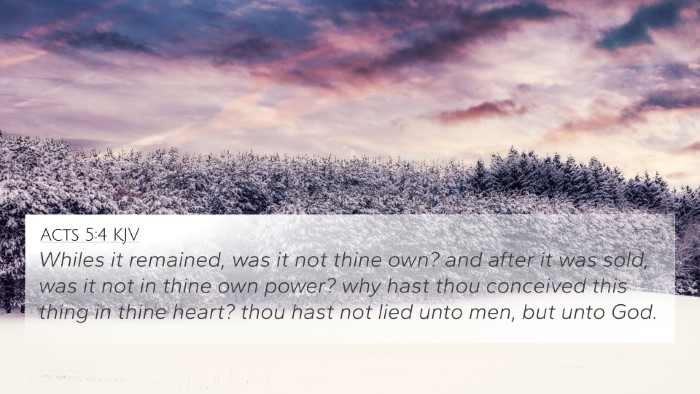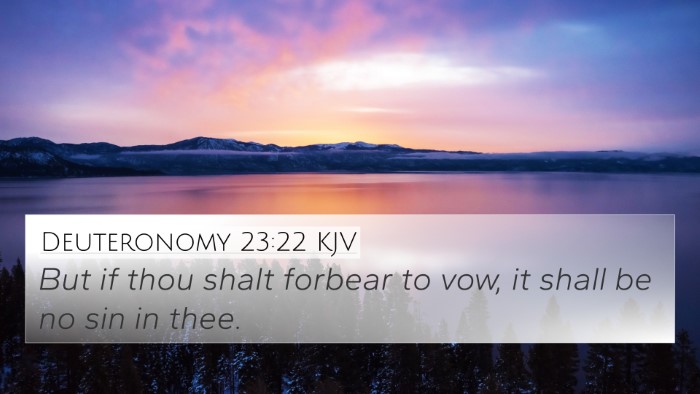Ecclesiastes 5:5 - Understanding and Interpretation
Verse: "Better is it that thou shouldest not vow, than that thou shouldest vow and not pay." (Ecclesiastes 5:5)
This verse from the Book of Ecclesiastes highlights the importance of integrity and the seriousness of commitments, particularly vows made unto God. Let's explore its deeper meanings.
Summary of Insights
Ecclesiastes 5:5 serves as a profound reminder of the weight of promises made, especially in the context of one's relationship with God. Here, we blend insights from various public domain commentaries.
Matthew Henry's Commentary
Henry emphasizes the gravity of making vows before God. He suggests that it is preferable to remain silent than to utter a vow that one cannot fulfill. This principle stands as a caution against the impulsiveness that can accompany religious expressions.
Albert Barnes' Notes
Barnes interprets this verse to underline the idea that God values sincerity over empty promises. He argues that the act of vowing should be approached with deep reverence, as failing to honor one's vow can lead to divine disfavor. Barnes stresses that it is better to refrain from making commitments than to dishonor them.
Adam Clarke's Commentary
Clarke adds that the theological underpinning of this verse warns about the heart's intentions. He argues that God desires truthfulness and fidelity in our conduct, noting that a vow made with carelessness could imply a lack of reverence towards the Holy. The implications of failing to keep a vow, Clarke suggests, could result in personal regret and a spiritual toll.
Key Themes and Keywords
- Integrity in commitments
- Reverence in religious practices
- Seriousness of promises to God
- The importance of thoughtfulness in speech
- Consequences of broken promises
- Spiritual accountability
Bible Cross-References
To enrich our understanding of Ecclesiastes 5:5, it is useful to consider several related verses that reflect similar themes:
- Numbers 30:2: "If a man vow a vow unto the Lord, or swear an oath to bind his soul with a bond; he shall not break his word..."
- Deuteronomy 23:21: "When thou shalt vow a vow unto the Lord thy God, thou shalt not slack to pay it..."
- Proverbs 20:25: "It is a snare to the man who devoureth that which is holy, and after vows to make inquiry."
- James 5:12: "But above all things, my brethren, swear not, neither by heaven, neither by the earth, neither by any other oath..."
- Matthew 5:37: "But let your communication be, Yea, yea; Nay, nay: for whatsoever is more than these cometh of evil."
- Psalm 76:11: "Vow, and pay unto the Lord your God: let all that be round about him bring presents unto him that ought to be feared."
- Ecclesiastes 5:4: "When thou vowest a vow unto God, defer not to pay it; for he hath no pleasure in fools..."
Connections Between Bible Verses
This verse resonates with a broader biblical theme concerning the seriousness of one's word. Cross-referencing allows us to see how different scriptures interact and support one another in illustrating God's expectations regarding commitment and integrity.
Applying Ecclesiastes 5:5 in Life
In a practical sense, Ecclesiastes 5:5 serves as a guideline for not only our spiritual interactions but also for our daily relationships. The concept of being true to one’s word can strengthen trust and respect in all facets of life.
Theological Reflections
From a theological standpoint, this verse shines light on the character of God, who desires honesty and integrity from His followers. The commitment to uphold one’s promises reflects the believer's understanding of God's own faithfulness.
Conclusion
In summary, Ecclesiastes 5:5 firmly conveys the message of prudence in making promises, especially when such promises are made in a sacred context. This verse encourages believers to reflect deeply on their words and commitments, ensuring they align with their capabilities and intentions.
Further Study and Exploration
For those interested in delving deeper into this theme, utilizing Bible concordances, cross-reference Bible study methods, and Bible reference resources can provide extensive insights. This approach not only enriches personal study but also enhances the understanding of the numerous connections between Bible verses.
Ultimately, Ecclesiastes 5:5 serves as a spiritual beacon, emphasizing the importance of integrity and sincerity in one’s relationship with God and others.





